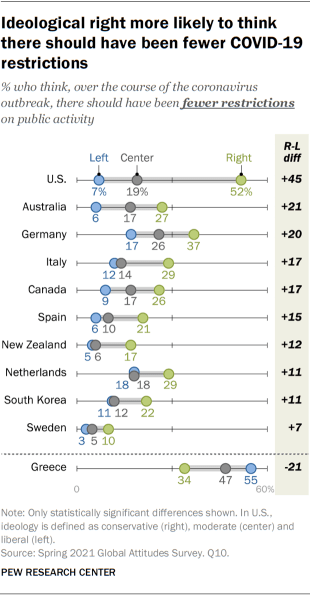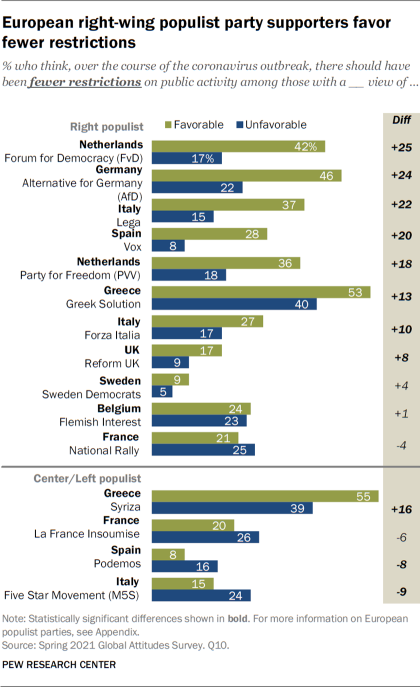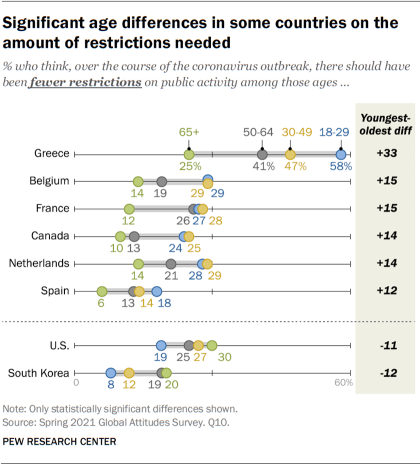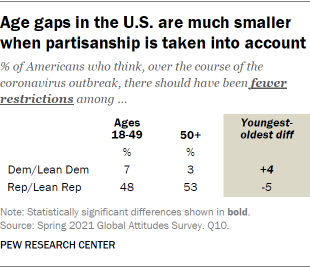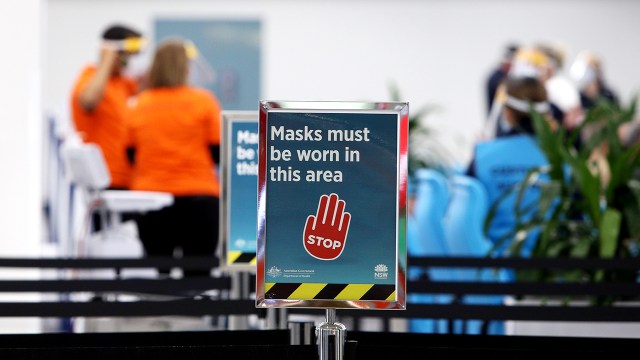
In many countries around the world, government attempts to impose coronavirus-related restrictions on public activity have encountered resistance and mass protest movements aimed at lockdowns. With the fast-spreading delta variant threatening a new wave of infections among the unvaccinated and slow, unequal vaccine rollouts globally, governments may yet again be forced to consider implementing restrictions on public activity.
This Pew Research Center analysis focuses on attitudes about COVID-19 restrictions and the people who said there should have been fewer restrictions on public activity over the course of the coronavirus outbreak. For non-U.S. data, this post draws on nationally representative surveys of 16,254 adults from March 12 to May 26, 2021, in 16 advanced economies. All surveys were conducted over the phone with adults in Canada, Belgium, France, Germany, Greece, Italy, the Netherlands, Spain, Sweden, the United Kingdom, Australia, Japan, New Zealand, Singapore, South Korea and Taiwan.
In the United States, we surveyed 2,596 U.S. adults from Feb. 1 to 7, 2021. Everyone who took part in the U.S. survey is a member of the Center’s American Trends Panel (ATP), an online survey panel that is recruited through national, random sampling of residential addresses. This way nearly all adults have a chance of selection. The survey is weighted to be representative of the U.S. adult population by gender, race, ethnicity, partisan affiliation, education and other categories.
To account for the fact that some publics refer to the coronavirus differently, in South Korea, the survey asked about the “Corona19 outbreak.” In Japan, the survey asked about the “novel coronavirus outbreak.” In Greece, the survey asked about the “coronavirus pandemic.” In Australia, Canada, New Zealand and Taiwan, the survey asked about the “COVID-19 outbreak.” All other surveys used the term the “coronavirus outbreak.”
Populist parties in this analysis are classified using three measures: the 2019 Chapel Hill Expert Survey (CHES), Norris’ Global Party Survey and The PopuList. For more, see this Appendix.
Here are the questions used for the report, along with responses. See our methodology database for more information about the survey methods outside the U.S. For respondents in the U.S., read more about the ATP’s methodology.
Majorities in most of the 17 advanced economies Pew Research Center surveyed in spring 2021 say the restrictions that had been imposed over the course of the pandemic were about right or that there should have been more restrictions. But significant minorities say there should have been fewer restrictions, suggesting they may be resistant to renewed lockdowns and social distancing requirements.
In most countries surveyed, those on the ideological right are particularly likely to say there should have been fewer restrictions on public activity over the course of the coronavirus outbreak. In keeping with previous findings, ideological divides between the left and right are largest in the United States with 52% of conservatives and 7% of liberals saying there should have been fewer restrictions. (The U.S. portion of the survey was conducted earlier than others, in early February.) Right-leaning people are significantly more likely to say restrictions went too far in nine other nations surveyed.
The only country where these ideological patterns are reversed is Greece – the public that also reports the highest proportion saying there should have been fewer restrictions. A majority (55%) of left-leaning Greeks say there should have been fewer restrictions, while only about a third (34%) of right-leaning Greeks hold that view.
This may be, in part, due to opinions among supporters of Greece’s left-leaning populist party Syriza, who are significantly more likely than Syriza detractors to say there should have been fewer restrictions (55% compared with 39%, respectively). Syriza leader Alexis Tsipras has accused the center-right government of using the pandemic as a pretext to restrict democratic rights and freedoms.
On the other hand, support for right-wing populist parties in most European countries is associated with more hostile views toward pandemic restrictions. In the Netherlands, those with favorable views of the right-wing populist parties Forum for Democracy (FvD) and Party for Freedom (PVV) are more likely to think restrictions went too far. The pattern among right-wing populist supporters to favor fewer restrictions is also particularly prominent among Alternative for Germany (AfD) supporters in Germany, Lega supporters in Italy and Vox supporters in Spain.
In some countries surveyed, younger adults are more likely to favor fewer coronavirus restrictions than are older adults. The age gap is largest in Greece, where 58% of 18- to 29-year-olds say there should have been fewer restrictions, compared with a quarter of those 65 and older – a difference of 33 percentage points. Significant differences also appear in Belgium, France, Canada, the Netherlands, Spain and Singapore.
Younger people in the U. S. and South Korea are less likely to say there should have been fewer restrictions on public activity over the course of the coronavirus outbreak. For example, 8% of younger South Koreans say there should have been fewer restrictions, compared with 20% of older South Koreans. Americans ages 18 to 29 are about 11 points less likely to say there should have been fewer restrictions than Americans ages 65 and older (19% and 30%, respectively).
In the U. S., this may be, in part, due to dynamics in party identification and age differences. Younger Americans are more likely to lean Democratic than older Americans and there are large partisan differences on the question: 51% of Republicans and Republican-leaning independents say there should have been fewer restrictions, compared with just 6% of Democrats and Democratic leaners. In the U.S., age gaps are much smaller when partisanship is taken into account. Among Republicans, those ages 50 and older are about as likely as those ages 18 to 49 to say there should have been fewer restrictions. Younger Democrats are more likely than older Democrats to say there should have been fewer restrictions, in line with patterns in other advanced economies. Still, Democrats as a whole overwhelmingly say there should have been more restrictions on public activity (81%).
Views of the economy are also tied to views about restrictions in about half of the publics surveyed. For example, 51% of Greeks who say the current economic situation is bad also say there should have been fewer restrictions, compared with a fifth of Greeks who think the economic situation is good.
Additionally, opinions about restrictions appear to be related to the actual strength of restrictions in each public during the fielding period as reported by the Oxford COVID-19 Government Response Tracker. Governments with the highest level of restrictions while the survey was fielding, such as Greece and Germany, also report some of the highest shares saying there should have been fewer restrictions over the course of the coronavirus outbreak.
Note: More information on how Pew Research Center classifies European populist parties can be found in the Appendix.



